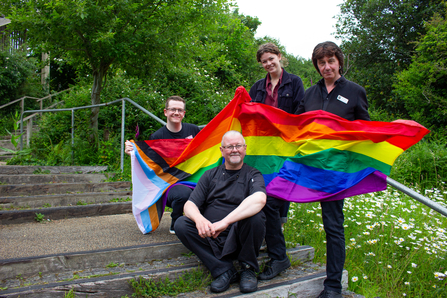My name is Freya, I’m the Media and Communications Officer at the Wildlife Trust of West and South Wales, and I identify as bisexual. I’d like to use this month to highlight my experience as an LGBTQ+ person, and contribute to the inclusive, accepting, and diverse environment which WTSWW has cultivated.
Wild About Inclusion - Freya Johns

I’ve never felt defined by my sexuality, and perhaps that’s why I’m struggling with writing this, but I grew up near Brighton where almost everyone was LGBTQ+ and it didn’t occur to me that this was a problem until I moved from the place which I had long called home, to elsewhere in the world. In Nepal I was a taboo, in Portugal I was unspeakable, and in Wales I am peculiar to say the least.
I grew up with a grandma who would pipe up with “Or a girlfriend!!” anytime anyone dared to ask me if I had a boyfriend yet, and I think this was instrumental in shaping my understanding of sexuality. I knew that my attraction to people wasn’t based on, or linked to, their gender from very early on - to me this seemed normal as I had never been put in a position where my attraction to someone was assumed to be based on how they identified. I’m grateful that I was never put in that box.
I was also raised to deliberately not conform to gender roles and expectations - I was raised in boys’ clothes, with mud all over my arms and legs, running wildly around the local nature reserve. My mum was a single mother and brought me up to believe that I should not fit myself into somebody’s else’s idea of what a woman should be. I was bold and outspoken and loud. Ultimately, I think this further disregard for traditional gender expectations encouraged my lack of concern for what gender someone identifies as, it really didn't matter to me whether someone was male, female, or identified any other way. For me it's about the person and the beliefs, not the gender.
As I grew up more and more people I attended school with came out. That was the moment at which I realised there was actually something to come out about. It had never crossed my mind that it would be necessary to explicitly state one’s preferences, because it simply hadn’t occurred to me that heterosexuality was an expectation at all.
A few years of turmoil passed in which I came to terms with the societal pressure surrounding being LGBTQ+ and I concluded that I still did not want to come out. I felt that for me, in the environment I was in, it seemed unnecessary. When I did eventually bring a girl home not even so much as an eyebrow was raised. No questions were asked, no comments were made, it was all treated perfectly as normal. Because that’s how it was in our house.
Around the same time, I transferred schools and that was when I began to realise the extent to which LGBTQ+ people are discriminated against. By this point I was secure and confident in my identity, but also myself, to the extent that I was able to offer support to others if they needed it. It wasn’t uncool to care. So, I became the ‘Equality and Diversity Student Leader’ (a role which I’d also had to create) so that I could bring about change within the school community. This was when I became the ‘go to’ for my peer’s problems and the moment at which I realised that sometimes being LGBTQ+ can be the difference between having opportunities or not. I made a lot of changes to the school’s policy and protocol surrounding LGBTQ+ students in the time that I was there but ultimately, I moved on to the big wide world.

When I first moved to Wales, I remember one of the first dates I went on was with a girl and that she was shocked that I would hold her hand in public. Again, it hadn’t occurred to me that this might be a problem, but the first words which came out of her mouth were “Don’t you think we’ll get hate crimed?”. 39% of LGBTQ+ people in Wales don’t feel comfortable holding their partner’s hand while walking down the street. Perhaps I shouldn’t have been so surprised. This single event shaped my perception of discrimination in Wales and after that I saw it everywhere. A woman in a cafe asking if her outfit “looked gay”, a boy in the gym calling his friend the 'F' slur, girls whispering about “Did you hear she’s gay?”. Maybe I’ve got rose tinted glasses but I’m sure I never heard that growing up in the Southeast.
I think I’m probably very lucky, but also very unusual, for never experiencing any direct discrimination. And I think this is also why I am so passionate about helping others – I like to think that I recognise my privilege, which is why I choose to use it to promote inclusivity and equality. This is why I am so fortunate to be a part of WTSWW - I am encouraged to speak out as an LGBTQ+ person, but also speak up for other LGBTQ+ people as well. The environment which WTSWW has cultivated truly nurtures and nourishes individuality. After all, the only kind of future in which nature and people thrive is a diverse one - to tackle the biggest challenges our planet faces, we need everyone.
